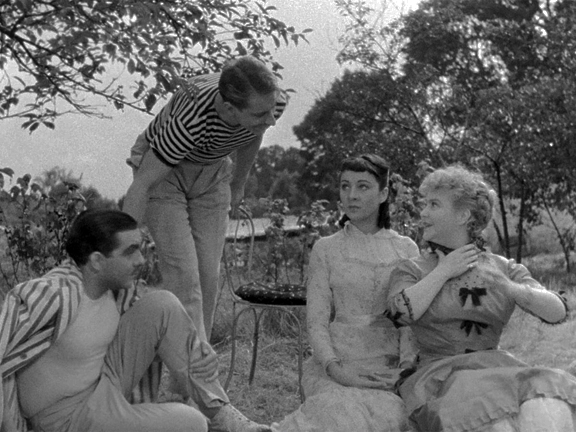Maupassant uses the phrase une partie de campagne as a euphemism for an outdoor picnic.
It’s a sad story about a romantic love that fizzles during a holiday celebrating a birthday, when the Dufours, a middle-class Parisian family, spend a day along the Seine at the Restaurant Poulin, a modest inn west of Paris. The day begins well enough but sated and a little drunk, Cyprian Dufour and a blond-haired man who is the fiancé of his daughter Henriette fall into a stupor and after dining. The women remain alert. And, catching the attention of two young men, the women accept an invitation for a row in their skiffs. Madame Dufour pairs off with an unnamed man while Henriette sits with Henri. Right off, the mother is willing to be seduced. It’s her birthday, and she celebrates by making love to her boater. But Henriette modestly allows Henri’s advances, and in one magical moment, they kiss but then, embarrassed, they separate and return to the inn. A year later, Henriette, now married to the blond-hair man, who eats like an ogre, sleeps on the grass like an animal. Once again, she meets Henri at the restaurant, who has also returned looking for her. Their “accidental” meeting finds them both in a funk and rueful of their lost opportunity: “She grew so pale when she saw Henri that at first, he thought she was going to faint; then, however, they began to talk quite naturally. But when he told her he was very fond of that spot and went there frequently on Sundays to indulge in memories, she looked into his eyes for a long time.” Of course, according to Maupassant’s dour way of the world, nothing comes of this.Jean Renoir’s Partie de Campagne (1936) is a faithful film adaptation of Maupassant’s story. It is among his most thoughtful and polished films. See Picnicsonfilm.com
See Guy De Maupassant. Guy De Maupassant, Original Short Stories, Translated By Albert M. C. McMaster, A. E. Henderson and Others; Gutenberg Http://www.Gutenberg.Org/Files/3090/3090-H/3090-H.Htm; Guy De Maupassant The Complete Stories of Guy De Maupassant, translated by M. Walter Dunne. New York: Walter J. Black, 1903;http://books.google.com/books?id=o8UZAAAAYAAJ&printsec=frontcover&source=gbs_ge_summary_r&cad=0#v=onepage&q=picnic&f=false; André Bazin. Jean Renoir Edited by Translated by W.W. Halsey II. New York: Simon & Schuster, 1973; Raymond Durgnat. Jean Renoir. Berkeley: The University of California Press, 1974;
*“Partie de Campagne” is sometimes translated as “A Day in the Country,” “A Country Excursion,” A Trip to the Country,” or “The Excursion.”


![Jean Renoir. A Day in the Country [Partie de Campagne] (1936/46). Screenplay by Jean Renoir based on Guy De Maupassant’s A Day in the Country [Une Partie de Campagne]. Pantheon Productions; http://www.dailymotion.com/video/xjkr30_partie-de-campagne-1936_shortfilms; Eli Lotar, photographer. Tournage du film de Jean Renoir "Une partie de campagne" (C) Centre Pompidou, MNAM-CCI, Dist. RMN-Grand Palais - @Droits réservés. The Dufour family picnic Henriette (Sylvia Bataille), Madame Dufour (Jeanne Marken), Grand Mére (Gabrielle Fontan), Monsieur Dufour (André Gabriello), and Anatole(Paul Temps) Henriette’s fiancé.](https://picnicwit.com/wp-content/uploads/2014/12/Jean-Renoir.-partie-de-campagne193646-e1417802492693.jpg)
![Jean Renoir. A Day in the Country [Partie de Campagne] (1936/46). Screenplay by Jean Renoir based on Guy De Maupassant’s A Day in the Country [Une Partie de Campagne]. Pantheon Productions; http://www.dailymotion.com/video/xjkr30_partie-de-campagne-1936_shortfilms; Eli Lotar, photographer. Tournage du film de Jean Renoir "Une partie de campagne" (C) Centre Pompidou, MNAM-CCI, Dist. RMN-Grand Palais - @Droits reserves. The would-be lovers, Heniette (Sylvia Bataille) and Roldophe (Jacques Brunius).](https://picnicwit.com/wp-content/uploads/2014/12/Jean-Renoir.-the-lovers.partie-de-campagne-e1417804292368.jpg)